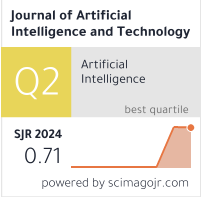A Vision-Based Robotic Navigation Method Using an Evolutionary and Fuzzy Q-Learning Approach
DOI:
https://doi.org/10.37965/jait.2024.0511Keywords:
CoppeliaSim, evolutionary algorithm, fuzzy Q-learning, optical flow, reinforced learning, vision-based control navigationAbstract
The paper presents a fuzzy Q-learning (FQL) and optical flow-based autonomous navigation approach. The FQL method takes decisions in an unknown environment and without mapping, using motion information and through a reinforcement signal into an evolutionary algorithm. The reinforcement signal is calculated by estimating the optical flow densities in areas of the camera to determine whether they are “dense” or “thin” which has a relationship with the proximity of objects. The results obtained show that the present approach improves the rate of learning compared with a method with a simple reward system and without the evolutionary component. The proposed system was implemented in a virtual robotics system using the CoppeliaSim software and in communication with Python.
Published
How to Cite
Issue
Section
License
Copyright (c) 2024 Authors

This work is licensed under a Creative Commons Attribution 4.0 International License.





